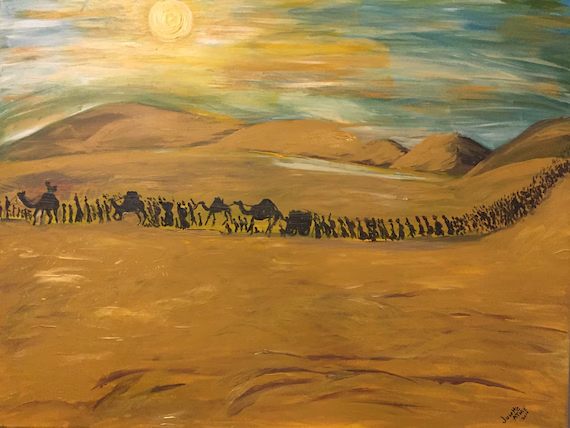Brave of Esther
King Xerxes was the rich and powerful ruler of the great Persian empire. When he had been king for three years, he gave a magnificent feast in his capital city of Susa.
Thousands of guests were served delicious food and drank wine from gold cups. The feast lasted for seven days.
One evening, the King wanted to show his beautiful queen to his guests. 'Bring Queen Vashti here to me, he ordered his servants.
The Queen was holding her own feast for her women friends, and sent a message refusing to come. King Xerxes was furious.
He had been made to look a fool in front of his guests, and knew that now every wife in Persia would think she could disobey her husband.
He ordered Queen Vashti out of his palace, and announced that she was no longer his wife. 'I'll have a new queen, he said.
King Xerxes sent his servants all over his kingdom to find the most beautiful girls so that he could choose one as his wife. A man named Mordecai worked in the King's palace.
He had been brought from Judah, and had a young cousin, named Esther. He had brought her up as his own daughter after her parents had died.
She was a beautiful, kind and sweet-tempered girl, so she was chosen by the King's servants.
When the King looked at all the magnificently dressed, beautiful girls, he chose Esther to be his new wife. Moradecai was delighted, but he warned Esther many times that she must never tell anyone that she was a Jewish girl, not a Persian.
One day, Mordecai overheard two men plotting to kill King Xerxes. He hurried to Esther. 'You must warn your husband, he said. And told her who the two men were.
Esther told the King, who had the two men put to death. He was very pleased that Esther and Mordecai had shown their loyalty to him, and ordered that Mordecai's name should be written in the palace records.
The King's chief of staff was a proud and cruel man, named Haman. He ordered that everyone had to bow down to him, but Mordecai refused.
'I am a Jew, and my people and I bow down only to God, he said.
Haman was very angry, and decided to get rid of Mordecai and all the Jewish people.
He went to the King, and told him that some people were making trouble in his kingdom. 'You may deal with them in any way you think best, said the King.
Haman ordered that Mordecai and all the other Jewish people were to be killed on a certain day. Only Mordecai knew that Queen Esther was also a Jew.
He told her what Haman had ordered. 'You must go to the King and beg him to save the lives of our people.
Esther was very upset, 'I can't go to the King, she said. 'I have to wait until he sends for me. If I go to him, he may be angry and have me killed.
God made you the Queen so that you could save us, replied Mordecai. Esther was terrified, but she bravely went to the King.
Haman was there with him. She invited them both to dinner the next day. The King was pleased, and Haman felt very proud that he would dine with the King and Queen.
Then he thought of Mordecai and how the Jew would not bow down to him.
Angrily, he ordered that Mordecai should be hanged the next morning.
That night, King Xerxes couldn't sleep. Reading through the palace records, he came across Mordecai's name and remembered that Mordecai had saved his life.
'I must reward him, said the King. So, instead of being hanged in the morning. Mordecai was rewarded with rich clothes and a fine horse.
When King Xerxes and Haman went to dine with Esther that day.
Esther begged the King for a kindness. The King looked at his beautiful wife. You may have anything you wish for.
You have only to ask, he said. 'I and all my Jewish people are to be killed. Please save us, said Esther.
The King was horrified. 'Who dared to give this order? He demanded.
'It was Haman, replied Esther.
Haman flang himself down on his knees in front of Esther and begged her to save him, but King Xerxes ordered that he should be hanged.
Then the King ordered that all the Jewish people were not to be killed, but were to be treated well and with respect.
Esther had saved her people.











Comments
Post a Comment